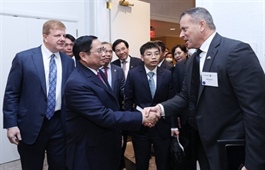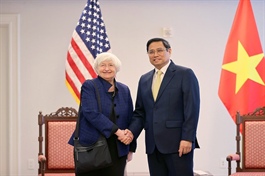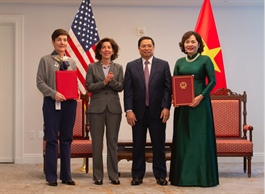Closing the gender gap in Vietnam's e-commerce
Closing the gender gap in Vietnam's e-commerce
Though e-commerce has been offering women more freedom and opportunities, a report conducted by the International Finance Corporation found that an additional $280 billion could be added to the value of the Southeast Asian e-commerce market between 2025 and 2030 if gender gaps were closed entirely. Emmanuelle Gounot, Intrepid Vietnam’s CEO, discussed with VIR’s Linh Le how women are overcoming gender barriers to thrive in this industry in Vietnam.
What is your assessment of the gender gap in e-commerce and how are Vietnamese women participating and performing in this industry?
Women are very active and well-represented in e-commerce. When I look around me, whether at platforms, specialised firms, brands, sellers, and middle-companies like Intrepid, I see a lot of women across all functions and also in leadership positions. From a recruiting perspective, it has been fairly easy to attract women. We've received a lot of applications from active, qualified and accomplished women. So I find that quite exciting.
At large in the industry, there is always more that can be done to further create opportunities for women, especially when we look at small business owners or sellers. The first that comes to my mind would be access to financing.
There are many new fintech offerings, and we need to make sure women are aware of and enabled to take advantage of them. Another area would be access to the right network and training. One thing that can be done as part of recruiting efforts is giving young women in schools exposure to coding and e-commerce at an earlier age. This is a fast-moving industry, so connection and constant innovation are very important.
An example of an initiative across the industry was the Lazada Forward Women Awards. In 2022, 18 women around the region were recognised for their contributions to the platform, and three of them were from Vietnam. Even though there is a lot more to be done, I think that Vietnam is off to the right start.
What are some existing barriers (and opportunities, if any) for women in e-commerce?
I would say e-commerce helps to level the playing field. When we look at the category mix, there are certain categories in which women tend to be less represented, in electronics for instance. But overall, it's easier for women to get involved and explore adjacent job families in e-commerce. Logistics, business intelligence, and tech are some areas where e-commerce has made it a bit more seamless for women to gain exposure while traditionally they would have been less represented.
For many sellers, e-commerce gives them the opportunity to work on their own hours and have more flexibility compared to traditional jobs where they need to be in the store at more regular hours. By definition, e-commerce enables remote work. So there is definitely an advantage there for women, especially sellers, versus opening a traditional physical store.
In terms of barriers, from the seller side, there are sometimes still gaps in access to the knowledge, network, and funding for women who want to start a business in e-commerce. However, across a broad range of jobs, I don't see a challenge in attracting women, but in the longer term, we need to do more to retain women and empower them to thrive and grow throughout their careers. What I have observed is that in Vietnam, women are still traditionally the main caregivers in their families.
While there is flexibility in e-commerce in terms of not having to be physically present in the stores, e-commerce shops also never close, and sometimes the hours can be both long and odd. This can sometimes cause a burden in maintaining work-life balance or work-life integration.
Aside from that, as an industry, there needs to be more investment in learning and development that caters to women's specific needs. A lot of studies show that at times women need more support in terms of boosting their confidence or presentation skills - some of the key aspects of e-commerce.
What measures has Intrepid Vietnam taken to create a more inclusive culture and support women?
We have a good representation of women within the workforce in Vietnam and across the region. As for our regional leadership team, out of the six country CEOs, four of them are women, and three of them are working mothers. This means that women joining us have a network of peers and a network of potential mentors and role models to support them in their development.
We're focused on diversity and inclusion at large, not just gender representation. We've done a number of surveys, for instance, to better understand what our employees are looking for and how we can better support them. For instance, as there has been a desire to retain some flexibility even after the pandemic, we continue to offer a hybrid work environment to maintain both meaningful interaction and work efficiency.
As for leadership and professional development, we developed an initiative called Intrepid University, where we offer a number of off-the-shelf courses and materials for our employees to complete in their own time, along with a number of other offline training programmes.
As a role model for younger female professionals, what advice would you pass on to the next generation of women in e-commerce to help them progress in this industry?
Something I would encourage women to look for when joining a new company, whether in e-commerce or other fields, is diversity in leadership ranks. Do your due diligence on the company values and culture to ensure that this is an environment where you can thrive.
Besides the representation of women, see if you get a sense of support from the men in the company. The reason I say that is because in my career, a lot of my mentors have been men who are great champions, and they've really supported me in my career development. It's important to have these allies as well.
In terms of learning and development, take benefit from the programmes available in your company and expand your network, both within and outside of your organisation. Earlier in my career, my peer networks had really given me support while I was working on building my self-confidence, and later on in life, when I went on maternity leave, it was important to have groups of women who were understanding of the experience, especially in a fast-moving industry like e-commerce.
My last advice is to invest your time instead of using your time and make sure you focus on the things that you can do best rather than trying to do it all. Pick your battles and see where you can deliver the most impact and get the highest return for your time and effort.






















